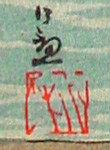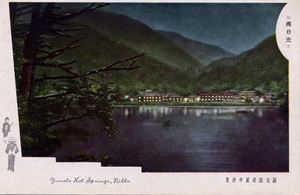About This Print
Number eleven of twenty-eight prints from the series Views of the Famous Sights of Japan (Nihon meisho zue) issued by the publisher Matsuki Heikichi in 1896 and 1897. (For additional information on this series see the article Views of the Famous Sights of Japan.)Yumoto Hot Springs
Source: Nikko Tourist Information Center http://www.nikko-jp.org/english/yumoto/index.htmlThe Yumoto Hot Spa is located in deep Senjogahara Plateau. Yumoto Hot Spa exists onthe north shore of the Lake Yunoko, the source of the Yukawa river. It is connected with SenjogaharaPlateau by the national route 120, and it takes you 30 minutes fromChuzenji Hot Spa by bus passing through the Senjogahara Plateau. Inaddition, you can go to the Yumoto Hot Spa passing through YudakiWaterfall and the west shore of the Lake Yunoko. You just need to go north on the hiking course of Senjogahara Plateau.
Source: Iwaki Yumoto org website http://www.iwakiyumoto.or.jp/e-traditn.stm
"Enkishiki Shinmei Chou", an ancient book that contains an official collection of data on all aspects of Japanese life, including laws, published in 927 during the Heian Period, introduced Iwaki Yumoto Hot Springs as Mitsunokuni Region`s Shrine of hot springs. This hot spring area is one of the three famous old hot springs together with 'Dogo Spring' in the ancient Iyonokuni Region and 'Arima Spring' in the ancient Settsunokuni Region. During the Nanboku Period, when Yumoto Castle was built, Yumoto Hot Springs became known as the hot springs that provided miraculous cures. It became popular among famous samurai warriors from Kamakura and surrounding areas. In those days, Yumoto Hot Springs, along with Shinano Hot Springs and Natori Hot Springs were known as the three hot springs with medical healing properties in Japan. During the Edo Period, Yumoto Hot Springs were crowded as it was the only town on the seaside road with 51 outdoor and 68 indoor bathing facilities. Annual visitors were said to be approximately 20,000. Yumoto was also a popular resting area for the Lords of Sendai and Soma as they made their alternate journeys own to Edo (now Tokyo). Yumoto was also frequently visited by a large number of writers and artists. In year 30 of the Meiji Era (1897), the Joban train line was opened and the number of visitors to Yumoto Hot Springs increased. Even today, Yumoto is the only hot spring area on Japans Railway System (Yumoto Station), as well as the only one on the Joban Express way or route 6.
Print Details
| IHL Catalog | #129 |
| Title or Description | Yumoto Hot Spring, Nikko Nikko Yumoto onsen 日光湯本温泉 |
| Series | Views of the Famous Sights of Japan Nihon meishō zue 日本名勝図会 |
| Artist | Kiyochika Kobayashi (1847-1915) |
| Signature |  |
| Seal | Kobayashi [as shown above] |
| Publication Date | November 1, 1896 (Meiji 29) |
| Publisher |  [Marks: seal not shown; pub. ref. 029] 日發行 印刷 兼発行者 日本橋区両国吉川町二番地 松木平吉 大平 |
| Impression | good |
| Colors | good |
| Condition | fair - light paper toning, wear and soiling; two horizontal folds with both ends of the fold thin; moisture stains on the upper left and lower right areas; unbacked and full margins |
| Genre | ukiyo-e - meisho-e |
| Miscellaneous | Number 11 in the series as marked in lower left margin. |
| Format | vertical oban |
| H x W Paper | 14 x 9 1/4 in. (35.6 x 23.5 cm) |
| H x W Image | 13 1/4 x 8 1/2 in. (33.7 x 21.6 cm) |
| Literature | |
| Collections This Print | Los Angeles County Museum of Art M.71.100.91; National Diet Library 寄別1-9-2-5 |
3/9/2020



